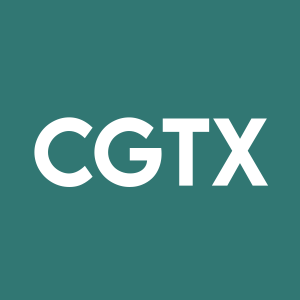Cognition Therapeutics Presented Data at Association for Research in Vision and Ophthalmology Showing Impact on Retinal Cell Health
Rhea-AI Summary
Positive
- Phase 2 trial showed 28.6% reduction in GA lesion growth vs placebo
- Preclinical data supports drug's potential in protecting retinal cells
- Drug demonstrates multiple therapeutic applications (dry AMD, Alzheimer's, Lewy body dementia)
- Zervimesine successfully reaches therapeutic concentrations in the eye
Negative
- None.
News Market Reaction 1 Alert
On the day this news was published, CGTX declined 8.76%, reflecting a notable negative market reaction.
Data tracked by StockTitan Argus on the day of publication.
PURCHASE, N.Y., May 09, 2025 (GLOBE NEWSWIRE) -- Cognition Therapeutics, Inc. (NASDAQ: CGTX), a clinical-stage company developing drugs that treat neurodegenerative disorders, reported preclinical data this week at the Association for Research in Vision and Ophthalmology (ARVO) showing the potential for zervimesine (CT1812) to protect retinal pigment epithelial (RPE) cells from damage in dry age-related macular degeneration (dry AMD).
"Dry AMD is driven by a number of factors that contribute to the death of retinal cells, leading to irreversible vision loss," stated Mary Hamby, PhD, vice president of research. "Preclinical research presented at ARVO supports our understanding of zervimesine’s potential for supporting retinal cell health and function."
Zervimesine is an oral drug candidate that has been shown to reach therapeutic concentrations in the eye and was investigated in the Phase 2 MAGNIFY clinical trial (NCT05893537). It binds to a receptor (TMEM97, also called the sigma-2 receptor), which is found on cells in the retina and brain. A poster presented by research scientist, Britney Lizama, PhD, shows that this receptor regulates the ability of retinal cells to take in low-density lipoprotein (LDL), a major fuel source for cells. The process that cells use to take in lipids is damaged in dry AMD, weakening the retinal cells and contributing to their mortality.
A second poster presented by Drs. Hamby and Lizama, shows zervimesine may protect retinal cells from the onslaught of oxidized lipids. In dry AMD, oxidized lipids build up in the retina. Together with other waste products, these lipids form aggregates called drusen, which is a hallmark of dry AMD. Drusen is believed to damage RPE cells and contribute to their eventual loss and subsequent loss of photoreceptors.
These data add to our growing understanding of zervimesine’s mechanism and its potential impact across age-related degenerative diseases. In a Phase 2 proof-of-concept clinical trial in 100 people with geographic atrophy secondary to dry AMD, treatment with zervimesine was shown to slow the rate of GA lesion growth by
| Cognition Therapeutics at ARVO: | ||
| Title: | Sigma-2 Receptor Modulation Promotes Retinal Pigment Epithelial Cell Survival Following Chronic 7-Ketocholesterol Exposure | |
| Authors: | Hamby ME, Lizama BN, Reaver A, Knezovich N, Caldwell J, Di Caro V, Caggiano AO | |
| Title: | Delineating Mechanisms of Sigma-2 Receptor Modulators in Regulating Retinal Pigment Epithelial Lipid Uptake | |
| Authors: | Lizama BN, Reaver A, Di Caro V, Caggiano AO, Hamby ME | |
Posters are available on the company’s Publications webpage.
About Dry AMD
Dry AMD is the more prevalent of two forms of age-related macular degeneration and accounts for up to
About Zervimesine (CT1812)
Zervimesine (CT1812) is an investigational oral, once-daily pill being developed for the treatment of CNS diseases such as Alzheimer’s disease and dementia with Lewy bodies (DLB). While these diseases have different symptoms, both are associated with the buildup of certain proteins in the brain - Aβ and ɑ-synuclein. As these proteins bind to neurons, they can damage and ultimately destroy the neurons. This results in a progressive loss in a person’s ability to learn, recall memories, move efficiently, or communicate. These diseases progress relentlessly and ultimately result in death. If zervimesine can interrupt the toxic effects of these proteins, it may be able to slow progression of disease and improve the lives of those suffering from Alzheimer’s and DLB. Zervimesine has been generally well tolerated in clinical studies to date.
The USAN Council has adopted zervimesine as the United States Adopted Name (USAN) for CT1812.
About Cognition Therapeutics, Inc.
Cognition Therapeutics, Inc., is a clinical-stage biopharmaceutical company discovering and developing innovative, small molecule therapeutics targeting age-related degenerative disorders of the central nervous system. We are currently investigating our lead candidate, zervimesine (CT1812), in clinical programs in dementia with Lewy bodies (DLB) and Alzheimer’s disease, including the ongoing START study (NCT05531656) in early Alzheimer’s disease. We believe zervimesine can regulate pathways that are impaired in these diseases though its interaction with the sigma-2 receptor, a mechanism that is functionally distinct from other approaches for the treatment of degenerative diseases. More about Cognition Therapeutics and our pipeline can be found at https://cogrx.com.
Forward-Looking Statements
This press release contains forward-looking statements within the meaning of The Private Securities Litigation Reform Act of 1995. All statements contained in this press release, other than statements of historical facts or statements that relate to present facts or current conditions, including but not limited to, statements regarding our expected runway, product candidates, including zervimesine (CT1812), and any expected or implied benefits or results, including that initial clinical results observed with respect to zervimesine will be replicated in later trials and our clinical development plans, and expectations regarding timing, success and data announcements of current ongoing preclinical and clinical trials are forward-looking statements. These statements, including statements relating to the timing and expected results of our clinical trials involve known and unknown risks, uncertainties and other important factors that may cause our actual results, performance, or achievements to be materially different from any future results, performance, or achievements expressed or implied by the forward-looking statements. In some cases, you can identify forward-looking statements by terms such as “may,” “might,” “will,” “should,” “expect,” “plan,” “aim,” “seek,” “anticipate,” “could,” “intend,” “target,” “project,” “contemplate,” “believe,” “estimate,” “predict,” “forecast,” “potential” or “continue” or the negative of these terms or other similar expressions. We have based these forward-looking statements largely on our current expectations and projections about future events and financial trends that we believe may affect our business, financial condition, and results of operations. These forward-looking statements speak only as of the date of this press release and are subject to a number of risks, uncertainties and assumptions, some of which cannot be predicted or quantified and some of which are beyond our control. Factors that may cause actual results to differ materially from current expectations include, but are not limited to: competition; our ability to secure new (and retain existing) grant funding; our ability to grow and manage growth, maintain relationships with suppliers and retain our management and key employees; our ability to successfully advance our current and future product candidates through development activities, preclinical studies and clinical trials and costs related thereto; uncertainties inherent in the results of preliminary data, pre-clinical studies and earlier-stage clinical trials being predictive of the results of early or later-stage clinical trials; the timing, scope and likelihood of regulatory filings and approvals, including regulatory approval of our product candidates; changes in applicable laws or regulations; the possibility that the we may be adversely affected by other economic, business or competitive factors, including ongoing economic uncertainty; our estimates of expenses and profitability; the evolution of the markets in which we compete; our ability to implement our strategic initiatives and continue to innovate our existing products; our ability to defend our intellectual property; impacts of global political changes and global economic conditions on our business, supply chain and labor force; our ability to maintain the listing of our common stock on the Nasdaq Global Market; and the risks and uncertainties described more fully in the “Risk Factors” section of our annual and quarterly reports filed with the Securities Exchange Commission and are available at www.sec.gov. These risks are not exhaustive, and we face both known and unknown risks. You should not rely on these forward-looking statements as predictions of future events. The events and circumstances reflected in our forward-looking statements may not be achieved or occur, and actual results could differ materially from those projected in the forward-looking statements. Moreover, we operate in a dynamic industry and economy. New risk factors and uncertainties may emerge from time to time, and it is not possible for management to predict all risk factors and uncertainties that we may face. Except as required by applicable law, we do not plan to publicly update or revise any forward-looking statements contained herein, whether as a result of any new information, future events, changed circumstances or otherwise.
| Contact Information: Cognition Therapeutics, Inc. info@cogrx.com | Casey McDonald (media) Tiberend Strategic Advisors, Inc. cmcdonald@tiberend.com | Mike Moyer (investors) LifeSci Advisors mmoyer@lifesciadvisors.com |
This press release was published by a CLEAR® Verified individual.








